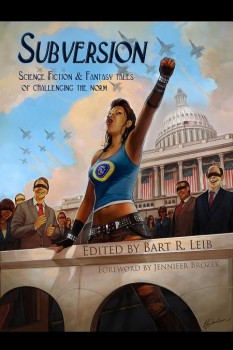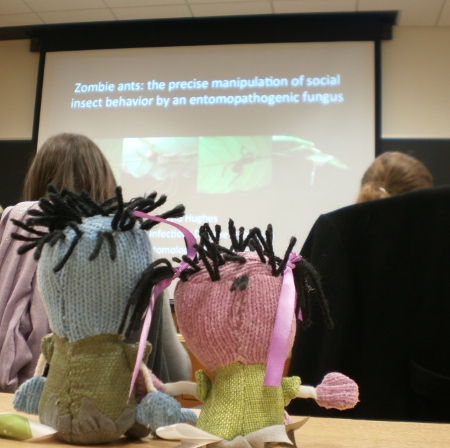A tiny crescent moon, just past new, hovered in the west. Rick hadn’t seen so many stars in years. Ruined castles were a good place to escape light pollution, he supposed. And with no roof on this section, there was nothing to interfere with moongazing. Not that he had any interest in that himself. Of course, if he’d been the one to relocate an entire thirteenth-century ruined castle from Normandy to Newfoundland, he would have at least put the roof back on.
“How the fuck can you do that,” he asked? The object of his inquiry was sprawled on a folding lounge chair, a sidecar in one hand and a bowl of smarties at his side. Even as Rick watched, he popped a few more smarties into his mouth, and washed them down with his cocktail.
“Do what, my dear?” Arthur asked, not taking his gaze from the sky.
“Smarties and cocktails. Yuck.”
“Smarties improve brain function, thus the name. But only the blue ones.” Arthur looked down at his drink before returning his gaze to the sky. “And sidecars make me happy. Smart and content: I generate my best ideas that way.”
Rick hoped Arthur would choke on his smarties.
“And what the fuck are we doing way out here anyway?”
“I came for the peace and quiet,” Arthur replied. “And you came because I pay you. And you are interfering with the peace. And the quiet. Kindly cease.”
Rick scowled, but only because it was too dark for Arthur to see his expression.
Arthur leaned back, setting his drink down so he could point at the moon. “See that?” he asked, but Rick didn’t think his boss was really talking to him. “That’s the same crescent moon that shone over Sarajevo on the 28th of June, the night that this whole chain of events were set in motion.” He lifted his drink again, slugged it, then threw the glass into the darkness. It crashed against a crumbling wall that was faintly silhouetted against the stars and disturbing the geese who were roosting there. They were probably Canada geese, Rick supposed, or at least Canadian. “A war began that day, a global catastrophe that resulted in the love of my life never having been born.”
Rick knew better than to ask how Arthur could possibly know that some unborn woman would have been the love of his life. Or man, maybe. Rick had never seen Arthur in a relationship of any sort. Whatever.
All Rick knew is that he didn’t want to listen to this. He retreated quietly into one of the more intact rooms, where he could at least have a battery lantern. Some kind of hippie group had been living here, or reenactors, or some shit like that, and they’d left a bunch of crap. The lantern was resting on what he thought was probably a broken loom, or maybe a torture device, and there was a longbow hanging on the wall. That he recognized for sure. Fucking hippies. He fished a beer out of the cooler. The sandwiches were starting to look good, but he’d wait until Arthur came in to eat. He still didn’t know why there was five pounds of fresh ginger in the cooler. Maybe Arthur was expecting a serious stomach upset from all the Smarties. The ginger was better than the biohazard-marked package labeled monkey serum, though. Rick really didn’t want to know what that was.
“Rick,” called Arthur from the outer darkness. “I have an idea.”
Rick rolled his eyes, but set his bottle on the loom-thing next to the lamp and went back out.
Arthur was up from his chair, pacing back and forth. “The Hubble Space Telescope can see back in time, billions of years back. Right?”
Rick nodded. Arthur couldn’t see him do it, but kept going anyway. “So how far away do you have to get to see back in time a hundred years. I could see my lost love’s ancestors, if I could just get a telescope in the right place and pointed this way.”
Rick didn’t think that was how it worked, but what did he know?
“What about Cassini? No, that’s not far enough, quite. There must be something.” Arthur stopped abruptly. “I must go talk to my contacts at NASA. What are you waiting for, Rick? We must leave immediately. And be careful with the bioluminescent camouflage suit. It’s very fragile.”
Arthur stared up, his face limned faintly in silver. Rick went back in to pack. His boss might be a lunatic, but he paid very well.
—
This, as with all the Friday Flash stories, was based on prompts suggested on twitter. I ask for ideas, and then use all of them. I give myself an hour, no more. There’s no planning, little plotting, and absolutely no editing whatsoever. There might however be drinking.
The whole thing is rather fun.
Tonight’s prompts came from:
@thc1972 bioluminescent camouflage
@quasigeo Sarajevo 1914, a broken loom, five pounds of raw ginger.
@notmoro monkey serum
@quasigeo ruins of a 13th c Normandy castle, Cassini/Huygens probe, flock of canada geese
@carolelaine a space telescope
@ravenbait a tube of smarties, all blue
@marjorie73 unrequited love and a longbow
@qitou sidecar (the drink)


